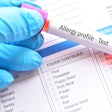
Ginsenoside Rb1 (GRb1), the major component of the ginseng plant and a known anti-inflammatory, may offer a powerful new approach to treating asthma by enhancing the body’s own immune-regulating cells.
South Korean researchers noted the potential role of the natural compound in the new study, “Asthma Alleviation by Ginsenoside Rb1 via Promotion of Treg Proliferation and Inflammatory T Cell Inhibition,” published in Allergy, the European Journal of Allergy and Clinical Immunology.
GRb1 works by enhancing the body’s own immune-regulating cells, significantly alleviating asthma symptoms by promoting the proliferation of regulatory T cells (Tregs) and suppressing inflammatory T cell activity. Tregs, which help maintain immune balance, are often deficient or dysfunctional in asthma patients. According to researchers, the findings could pave the way for a novel class of asthma therapies rooted in natural medicine.
The study screened 250 natural products and identified gRb1 — a major active component of Panax ginseng — as a potent modulator of immune responses. In both mouse models and human blood samples, gRb1 increased the number and function of Tregs while reducing populations of inflammatory T cells such as Th17, Th1 and Th2.
Key findings from the study include:
- Immune modulation: gRb1 enhanced Treg activity through STAT5 and NFAT1 signaling pathways, crucial for Treg development and function.
- Inflammation reduction: The compound suppressed inflammatory cytokines, including IL-17A, IFN-γ and TNF-α.
- Symptom relief: In mouse models, gRb1 reduced airway resistance, mucus production and lung inflammation.
- Human relevance: In blood samples from asthma patients, gRb1 restored Treg levels and reduced inflammatory markers, even in those with severe disease.
According to researchers, this study is the first to demonstrate that ginsenoside Rb1 can rebalance immune responses in asthma by enhancing Treg populations, and it could open the door to the development of plant-based immunotherapies that are both effective and well-tolerated.
The research also found that gRb1 did not cause liver toxicity — a common concern in drug development — and even reduced liver inflammation in asthma-induced mice.
Despite the promising results, researchers called for clinical trials to confirm the safety and efficacy of gRb1 in humans. If successful, gRb1 could become a cornerstone in the next generation of asthma treatments, especially for patients who do not respond well to conventional therapies.























